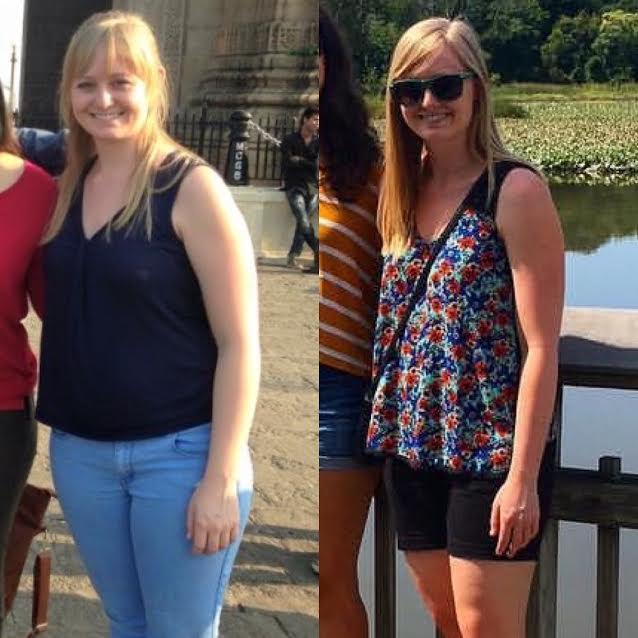Kelly Barber

Embracing fitness was without question the best change I made for myself in 2016. I recently passed the one year mark of starting Crossfit (my first foundations class was on 11/9) and while I wish I had done some things differently, I’m proud of the modest progress I’ve made so far and I’m in awe of the residual effects on my mental health.Growing up, I mostly did individualized sports: tae kwon do, gymnastics, diving, swimming, and flying trapeze. I preferred refined activities that required flexibility, grace, technical precision, and body awareness. To this day, I don’t think anything has been more satisfying than doing back flips or more exhilarating than a successful catch in a flying trapeze show, punctuated by the crowd’s roar.
As is unfortunately common, I picked up unhealthy habits when I went to college and fell into four years of lazy indulgence. Once in a blue moon I would do yoga with a friend or go rock climbing, but exercise was no longer a part of my normal routine. My senior year it dawned on me that I was about to lose free access to a 140,000 square foot state of the art fitness complex I had hardly touched. I started taking classes 3-4 times a week: pilates, total body, cycle. My main motivation was cosmetic; I was at my fattest and pastiest and wanted to do something about it. I measured success solely in how toned my legs and stomach looked. My experience with exercise was about as superficial as most college relationships.
In 2014 I moved to D.C. and told myself that all of the walking and stair climbing I was doing counted as exercise. By the time I joined Crossfit in 2015, I was as out of shape as I’d ever been. Dan encouraged me to take a foundations class at Ballston Crossfit and I did, since I liked the idea of utilizing personalized coaching and a group setting to learn how to weightlift. I’d never lifted a barbell in my life, except for one embarrassing experience in college when I tried to do a back squat and immediately fell on my butt, before exiting the gym as fast as humanly possible.
I was hooked from the start due to the constantly varied programming (combining cardio, gymnastics, and lifting) and the ambitious, inspiring culture fostered by the BCF members and coaches. The strength training and skill building sessions gave me the technical challenges I’d always loved in individualized sports and the signature short WODs (workout of the day) tricked me into enjoying cardio and allowed me to tap into a whole new level of sustained, intense focus.
In a year, I went from being completely incapable of a single knee raise to doing toes to bar. I learned to do double unders, rope climbs, scaled handstand push ups, and heavy, unbroken sets of wall ball shots and kettlebell swings. I can run farther and faster than I ever have before. I can strict press 70 lbs, deadlift 175, back squat 150, squat clean 110, snatch 70+, and clean and jerk 105, all big improvements from my meager lifts this time last year. And perhaps most importantly, I’m a much better arm wrestler.
For the first time in my life, I feel strong. Now that I know what a deeply empowering experience that is, I can’t believe our society has largely abandoned physical strength as the baseline for personal development. It pains me to think about how few women in particular take advantage of such a wonderful opportunity to boost their confidence and improve their lives. Lord knows I wish I’d had Crossfit when I was an awkward, miserable thirteen year old with body issues.
But the most dramatic evolution Crossfit has made in my life isn’t the physical feats or even the self-confidence, it’s the changes to my mental health.
When I first started to take control of my own life in high school, I identified obsessive, perfectionist tendencies in myself and acknowledged that I’d probably always be fighting to keep those characteristics in check. I still remember the day I first shifted my mindset by realigning my priorities and expectations. As a result, I became a more relaxed person, someone who lived more in the moment and didn’t overthink things or worry unnecessarily quite as much. It was easy to maintain this perspective while living inside the enclosed safe space that is college. But after entering the real world, I gradually felt myself losing those traits I’d carefully collected and with them, part of my chosen identity.
Most of the anxiety and stress that resulted began to manifest itself in my professional life. I developed a dysfunctional, obsessive relationship with work that launched me into a downward spiral and caused me to dissolve into tears in my boss’s office more than once. My behavior was sustained because part of me thrived in the comfortable familiarity of constantly throwing myself at task after task. Ticking off the check boxes wasn’t really providing me meaning but it gave me quick, addicting fixes of fleeting satisfaction. I fed that part of myself by staying endlessly busy, causing it to grow in power and size until it choked out the rest of me.
During that time, I started Crossfit and it quickly became my form of therapy. After furiously typing away at my keyboard for nine hours nonstop except to scarf down lunch, I would force myself to go to the gym. It seemed magical: I would enter the gym a zombie and would leave energized and full of life. And the best part was that it was 100% effective.
Crossfit became my refuge of meditation where I didn’t think at all. All I had to do was show up and do the proscribed programming, usually scaled down. Each time I gave the workout my all, but I didn’t spend any time outside of the gym setting goals. Crossfit was my space for anti-obsession.
As a result, it ended up being the place where I learned to develop real self-control. In the middle of a workout when I realized everyone else was way ahead of me and I felt myself start to despair, I would dial into the reason I was there in the first place and would renew my focus on my individual journey, letting go of the fear of being last. Or, when I was on the verge of giving up during a particularly tough movement or run, I would talk myself into continuing, latching onto whatever dumb thing came to mind to give me the motivation I needed to keep going.
These acts of mental gymnastics allowed me to exercise my ability to shape my own path through conscious decisions during emotionally taxing moments. Working out has helped reprogram my neurological pathways in ways that affect all other areas of my life. Just last night when I felt creeping anxiety and stress, I was able to hold the sensations at bay by simply recognizing the feeling and making the choice to relax and have a good time instead. It wasn’t easy — just like during a brutal workout, I had to keep recommitting to my decision, but it got easier as the night went on.
I used to think behaving obsessively was a sign that I was too controlling. Crossfit has helped me develop the self-awareness I needed in order to realize that it’s actually a sign that I’m allowing myself to be controlled by negative emotions and that I need to dial back into my sense of inner peace and purpose so I can live ambitiously in a healthy way. I’m still a novice both physically and mentally, but I’m grateful for how much I’ve learned already and for how much is still in store.

